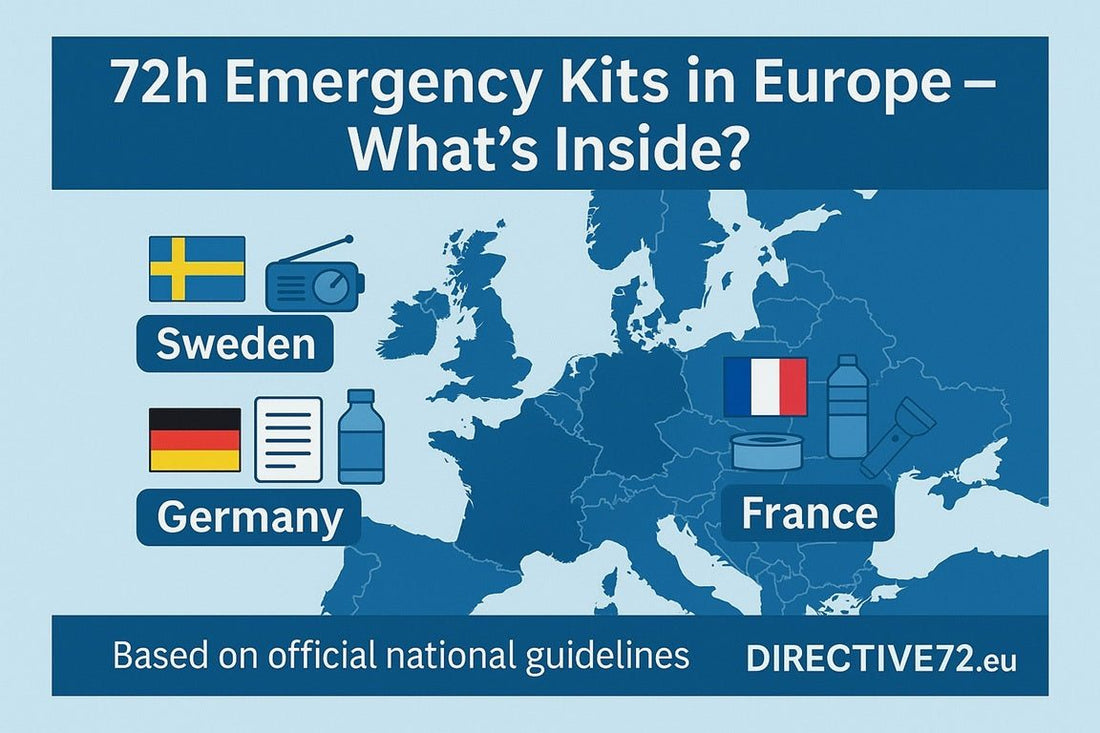
What Should a 72-Hour Emergency Kit Contain? A Comparison of Sweden, Germany, and France
Share
In an era of increasing global uncertainties, many European nations are emphasizing the importance of individual preparedness. A 72-hour emergency kit is a foundational element in this strategy, designed to help individuals and families sustain themselves during the initial phase of a crisis. While the core components are similar, each country tailors its recommendations based on specific risks, cultural practices, and governmental guidelines.
Sweden: Emphasizing Self-Reliance
Sweden's Civil Contingencies Agency advises citizens to be prepared to manage without external assistance for at least 72 hours. Their guidance focuses on:
- Water: At least 3 liters per person per day.
- Food: Non-perishable items that require minimal preparation.
- Heating: Alternative heat sources and warm clothing.
- Communication: Battery-powered or crank radios to receive information.
- Lighting: Flashlights and candles.
- First Aid: Essential medical supplies and personal medications.
- Cash: Small denominations for transactions during power outages.
Sweden also distributes a national preparedness guide titled "If Crisis or War Comes" to educate the public on what to expect and how to prepare.
Germany: Structured and Comprehensive Preparedness
Germany's Federal Office of Civil Protection recommends a more extensive approach, suggesting households prepare for up to 10 days. Key recommendations include:
- Water: 20 liters per person.
- Food: A variety of non-perishable items totaling approximately 2,200 kcal per person per day.
- Medical Supplies: First aid kits and a reserve of essential medications.
- Lighting and Communication: Battery-powered radios and flashlights with spare batteries.
- Documents: Copies of important documents stored securely.
- Cash: To facilitate purchases if electronic systems fail.
Germany also encourages the use of civil protection apps to receive real-time alerts and official instructions during crises.
France: Recent Initiatives in Emergency Preparedness
In response to evolving global threats, France is developing a "survival manual" intended for distribution to all households. This manual advises citizens to prepare a 72-hour emergency kit containing:
- Water: At least 6 liters per person.
- Food: Approximately 10 cans of non-perishable food items.
- Lighting: Flashlights and spare batteries.
- Medical Supplies: Basic first aid materials, including paracetamol and antiseptics.
- Communication: Battery-powered radios to stay informed.
- Personal Items: Important documents, warm clothing, and essential tools.
Comparative Overview
| Item | 🇸🇪 Sweden | 🇩🇪 Germany | 🇫🇷 France |
|---|---|---|---|
| Water per person | 3L/day | 20L total | 6L total |
| Food supply duration | 3 days | 10 days | 3 days |
| Heating solutions | Yes | Yes | Not specified |
| Communication devices | Radio | Radio | Radio |
| Medical supplies | Basic kit | Comprehensive kit | Basic kit |
| Document copies | Recommended | Recommended | Recommended |
| Cash reserves | Yes | Yes | Yes |
Why Do These Differences Exist?
Preparedness strategies vary due to:
- Collective vs. individual mindsets: Some cultures emphasize personal responsibility, others rely more on state intervention.
- Trust in institutions: National trust levels shape how citizens respond to government guidelines.
- Climate and risk exposure: Northern countries may prioritize heating and power, while others focus on food and civil stability.
Why a Unified European Kit Makes Sense
Despite national differences, the core risks we face — whether climatic, cyber, or geopolitical — often transcend borders.
- A well-designed base kit can cover 80% of needs across Europe.
- Directive72.eu offers a customizable system inspired by multiple official recommendations, built for clarity and practicality.
Conclusion
While the specifics of each country's recommendations vary, the underlying principle remains consistent: individuals should be prepared to sustain themselves during the initial phase of a crisis. By assembling a well-thought-out emergency kit, citizens can enhance their resilience and reduce dependence on external assistance during emergencies.


